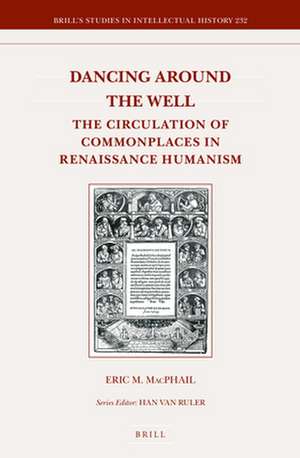Dancing around the Well: The Circulation of Commonplaces in Renaissance Humanism: Brill's Studies in Intellectual History, cartea 232
Autor Eric M. MacPhailen Limba Engleză Hardback – 31 aug 2014
Din seria Brill's Studies in Intellectual History
- 18%
 Preț: 984.01 lei
Preț: 984.01 lei - 18%
 Preț: 935.71 lei
Preț: 935.71 lei - 18%
 Preț: 540.84 lei
Preț: 540.84 lei - 18%
 Preț: 930.18 lei
Preț: 930.18 lei - 18%
 Preț: 676.35 lei
Preț: 676.35 lei - 18%
 Preț: 680.77 lei
Preț: 680.77 lei - 18%
 Preț: 685.36 lei
Preț: 685.36 lei - 18%
 Preț: 681.86 lei
Preț: 681.86 lei - 18%
 Preț: 666.77 lei
Preț: 666.77 lei - 18%
 Preț: 675.95 lei
Preț: 675.95 lei - 18%
 Preț: 679.15 lei
Preț: 679.15 lei - 18%
 Preț: 675.80 lei
Preț: 675.80 lei - 18%
 Preț: 684.76 lei
Preț: 684.76 lei - 18%
 Preț: 685.13 lei
Preț: 685.13 lei - 18%
 Preț: 686.83 lei
Preț: 686.83 lei -
 Preț: 232.42 lei
Preț: 232.42 lei - 18%
 Preț: 1025.55 lei
Preț: 1025.55 lei - 18%
 Preț: 686.23 lei
Preț: 686.23 lei - 18%
 Preț: 682.79 lei
Preț: 682.79 lei - 18%
 Preț: 669.20 lei
Preț: 669.20 lei - 18%
 Preț: 677.36 lei
Preț: 677.36 lei - 18%
 Preț: 678.97 lei
Preț: 678.97 lei - 18%
 Preț: 677.11 lei
Preț: 677.11 lei - 18%
 Preț: 677.50 lei
Preț: 677.50 lei - 18%
 Preț: 676.83 lei
Preț: 676.83 lei - 18%
 Preț: 675.91 lei
Preț: 675.91 lei - 18%
 Preț: 676.96 lei
Preț: 676.96 lei - 18%
 Preț: 680.55 lei
Preț: 680.55 lei - 18%
 Preț: 677.58 lei
Preț: 677.58 lei - 18%
 Preț: 1036.67 lei
Preț: 1036.67 lei - 18%
 Preț: 676.49 lei
Preț: 676.49 lei - 18%
 Preț: 680.77 lei
Preț: 680.77 lei - 18%
 Preț: 680.14 lei
Preț: 680.14 lei - 18%
 Preț: 670.78 lei
Preț: 670.78 lei - 18%
 Preț: 674.81 lei
Preț: 674.81 lei - 18%
 Preț: 680.00 lei
Preț: 680.00 lei - 18%
 Preț: 678.37 lei
Preț: 678.37 lei - 18%
 Preț: 670.85 lei
Preț: 670.85 lei - 18%
 Preț: 681.08 lei
Preț: 681.08 lei - 18%
 Preț: 682.73 lei
Preț: 682.73 lei - 18%
 Preț: 681.99 lei
Preț: 681.99 lei - 18%
 Preț: 679.08 lei
Preț: 679.08 lei - 18%
 Preț: 678.91 lei
Preț: 678.91 lei - 18%
 Preț: 682.32 lei
Preț: 682.32 lei - 18%
 Preț: 572.94 lei
Preț: 572.94 lei - 18%
 Preț: 680.69 lei
Preț: 680.69 lei - 18%
 Preț: 687.30 lei
Preț: 687.30 lei - 18%
 Preț: 681.63 lei
Preț: 681.63 lei - 18%
 Preț: 681.31 lei
Preț: 681.31 lei - 18%
 Preț: 679.22 lei
Preț: 679.22 lei
Preț: 574.35 lei
Preț vechi: 700.42 lei
-18% Nou
Puncte Express: 862
Preț estimativ în valută:
109.91€ • 119.35$ • 92.33£
109.91€ • 119.35$ • 92.33£
Carte indisponibilă temporar
Doresc să fiu notificat când acest titlu va fi disponibil:
Se trimite...
Preluare comenzi: 021 569.72.76
Specificații
ISBN-13: 9789004274396
ISBN-10: 9004274391
Pagini: 174
Dimensiuni: 155 x 235 x 15 mm
Greutate: 0.38 kg
Editura: Brill
Colecția Brill
Seria Brill's Studies in Intellectual History
ISBN-10: 9004274391
Pagini: 174
Dimensiuni: 155 x 235 x 15 mm
Greutate: 0.38 kg
Editura: Brill
Colecția Brill
Seria Brill's Studies in Intellectual History
Cuprins
Abbreviations
Introduction: Dancing Around the Well
1. In the Beginning there was Chaos
2. A Gem in its Setting
3. Words Frozen and Thawed
4. Rhapsody in Prose
5. The Mosaic of Speech
6. The Universal Library
7. In a Roman Mirror
Conclusion: Emptying the Well
Bibliography
Index locorum communium
Index rerum
Index nominum
Index Erasmianus
Introduction: Dancing Around the Well
1. In the Beginning there was Chaos
2. A Gem in its Setting
3. Words Frozen and Thawed
4. Rhapsody in Prose
5. The Mosaic of Speech
6. The Universal Library
7. In a Roman Mirror
Conclusion: Emptying the Well
Bibliography
Index locorum communium
Index rerum
Index nominum
Index Erasmianus
Notă biografică
Eric MacPhail, Ph.D. (1988) Princeton University, is Professor of French at Indiana University. He has published widely on French Renaissance literature and on the classical tradition in Renaissance humanism, including The Sophistic Renaissance (Droz, 2011).
Recenzii
“MacPhail’s book offers a highly readable and informative reconstruction of the circulation of classical adages in diverse genres of Latin and vernacular literature in the last decades of the sixteenth century. […] The technique of using proverbial sayings in dedicatory and familiar epistles had been developed by Angelo Poliziano and perfected by Erasmus, who noted that proverbs in letters are like jewels mounted on a ring, and so promote a special relationship between writer and addressee. […] By drawing our attention to this recurring feature of Renaissance literary discourse, MacPhail makes a splendid contribution that is certain to stimulate further discussion about the humanists’ manipulation of classical commonplaces. As MacPhail demonstrates so effectively, the adages are important components of a fascinating literary era.”
Riemer A. Faber, University of Waterloo. In: Renaissance Quarterly, Vol. 68, No. 4 (Winter 2015), pp. 1352-1354.
Riemer A. Faber, University of Waterloo. In: Renaissance Quarterly, Vol. 68, No. 4 (Winter 2015), pp. 1352-1354.
